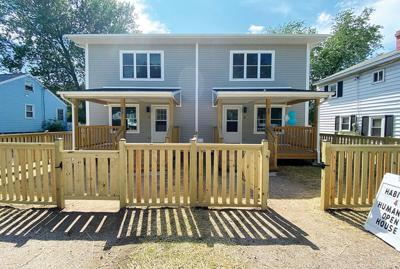How many of you share my sense of inadequacy relative to our housing crisis and climate change? The bad news is that both challenges are mind-bogglingly enormous. The good news is that some strategies help us make progress on both fronts.
While these challenges clearly require macro initiatives, micro initiatives are also part of the solution. To make meaningful progress our toolboxes for each must include multiple interventions.
One way to combat unaffordability and global warming is smart and efficient use of land when developing housing. Government land use policies can be vehicles that promote smart and efficient land use. Take a walk along Market Street and you will see large, high-rise, multi-unit apartment or condominium developments. South Burlington’s land development regulations for City Center made these developments possible; they also require new buildings to be energy efficient.
In general, it is less costly on a unit basis to build many housing units in one structure than to construct the same number of units in separate structures. In addition, this approach uses less land, thus reducing its cost. These savings should result in lower rents or purchase prices.
Typically, units in one structure are smaller in square footage than the same number units built in separate structures. The combined effect of less space and energy efficiency results in lower energy consumption and lower costs for heating and cooling.
Building large, multi-unit buildings is a key means to promoting affordability and less energy consumption on a large scale. Smaller scale approaches are also necessary. Even the addition of a single housing unit, assuming it is of modest size and energy efficient, addresses the housing crisis in a way that reduces the climate impact of producing the housing we need to address homelessness. Each of us needs to consider the importance of housing type — single family, duplex, triplex, multi-unit, etc. — unit size and energy-consumption characteristics when forming our position on new developments proposed for our neighborhoods.
Historically, Vermont has enacted statutes that recognize the importance of increasing its housing stock, including laws authorizing only one or a small number of additional housing units. One law bars any municipality from adopting zoning that prohibits the development of manufactured home parks. In the past, manufactured homes were not energy efficient. They now have stronger energy efficiency standards and Efficiency Vermont operates the Zero Energy Modular Home Program, which assists folks in purchasing net zero manufactured homes.
Another law requires all municipalities to have zoning allowing homeowners to add an accessory dwelling unit within or adjacent to their primary residence; the owner must live in one or the other.
During April, which is Fair Housing Month, learn more about accessory dwelling units at the program, “Is an ADU Right for You?”, hosted by the South Burlington Affordable Housing Committee and the library on Thursday, April 18, 7-8 p.m., in the South Burlington Library community room.
In 2023 Vermont enacted a statute requiring all municipalities to allow the conversion of single-family housing units to duplexes. This legislation also requires zoning that authorizes up to five housing units on land with access to municipal water and sewer service — another example of promoting smart and efficient land use.
I encourage every resident to assess whether any of these options for adding one or more housing units is compatible with their living and financial situation. Empty nesters living in large homes could convert their homes to duplexes? Or add an accessory dwelling unit? If sharing your home would help meet your needs, HomeShare Vermont does the work of matching you with a person who is mutually compatible (homesharevermont.org).
Regarding existing homes, weatherization is a proven method for reducing the cost of heating and cooling, thereby reducing the household’s carbon footprint. Champlain Valley Office of Economic Opportunity’s Weatherization program (cvoeo.org) and Efficiency Vermont (efficiencyvermont.com) are valuable resources for choosing and carrying out a weatherization project. In addition, Vermont’s Weatherization Assistance program (dcf.vermont.gov) provides financial assistance to income-eligible households to defray the cost of weatherization.
Strategies that involve large upfront investments are beyond the capacity of many Vermont households. It is both necessary and prudent to have programs that assist lower-income households in completing projects that increase affordability and combat climate change.
Equally important, if you share my belief that South Burlington has a duty to do more to address these crises, make your voice heard. When new housing proposals come before the development review board, state your support at the hearing or in a letter. Too often only residents who oppose projects attend these meetings, likely giving a false impression of community sentiment.
Ask the city council to adopt a housing action plan to complement the city’s climate action plan. Attending and sharing your thoughts at energy and affordable housing committee meetings, as well as city council and planning commission meetings and hearings are opportunities for increased knowledge and involvement.
Let’s keep up and increase the good work.
Sandy Dooley is a 50-plus year resident of South Burlington and a member of the Affordable Housing Committee. She served on Champlain Housing Trust’s board of directors for nine years. Tom Getz and Nora Senecal, also affordable housing committee members, assisted her in preparing this article. Clean & Green is a regular feature by the South Burlington Energy Committee.




















(0) comments
Welcome to the discussion.
Log In
Keep it clean. Please avoid obscene, vulgar, lewd, racist or sexual language.
PLEASE TURN OFF YOUR CAPS LOCK.
Don't threaten. Threats of harming another person will not be tolerated.
Be truthful. Don't knowingly lie about anyone or anything.
Be nice. No racism, sexism or any sort of -ism that is degrading to another person.
Be proactive. Use the "Report" link on each comment to let us know of abusive posts.
Share with us. We'd love to hear eyewitness accounts, the history behind an article.